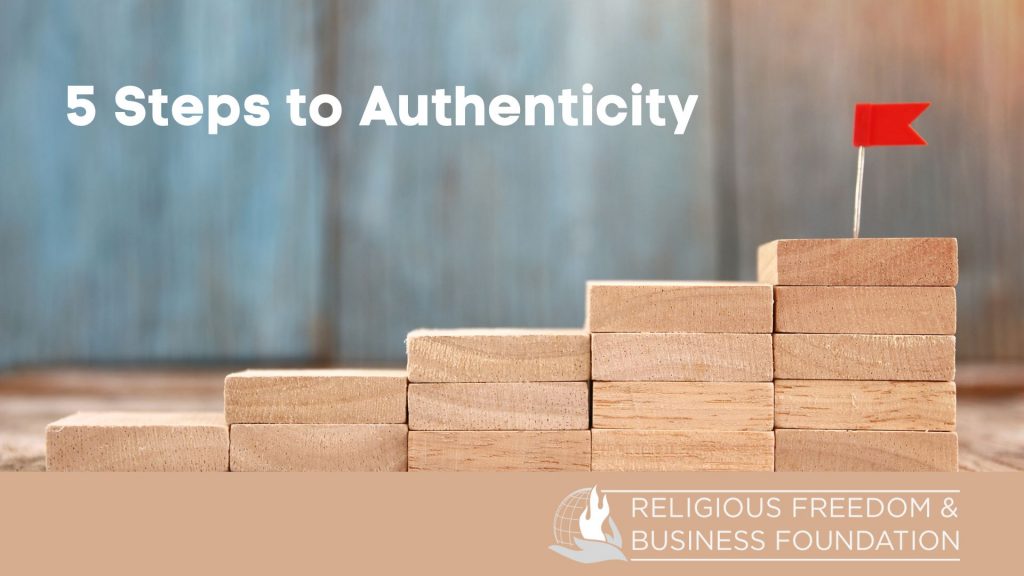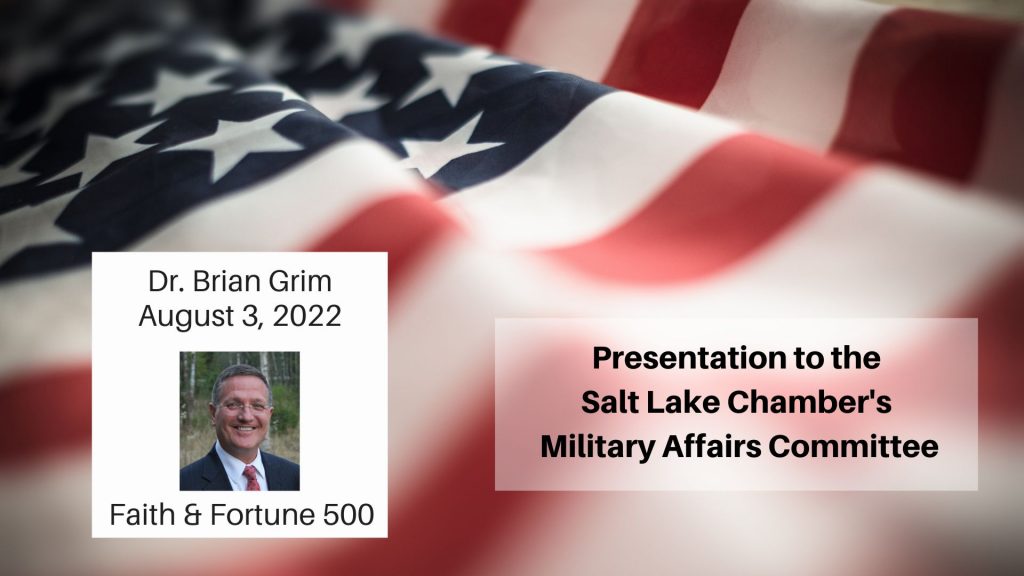by Kent Johnson, J.D., Senior Corporate Advisor, Religious Freedom & Business Foundation
A contribution to the “How to Engage Faith & Belief at Work” section in the Blog Series Authenticity & Connection
Diversity professionals often urge employees to “be authentic,” to “bring your whole self to work,” and to “be true to yourself.” Sounds good. Sounds liberating. But what is “authenticity?” What does it mean to be authentic? And how can one be “authentic” at work? This column will provide five steps to do just that.
For starters, I’d submit that in order to be true to myself, I must first do the hard work to explore and begin to answer the question, “Who AM I?”
Regardless of how one defines oneself, authenticity simply can’t be lived out unreflectively, moment by moment. A person who navigates the winds and waves of work and life unreflectively, day after day, runs the risk of sometimes violating the core principles and beliefs that person claims to embrace. To live contrary to one’s core principles and beliefs is to violate one’s core identity. It would entail living a lie. Living inauthentically.
Some may object to this line of reasoning on the basis that it seems designed to impose guilt or a set of external rules. That’s not my intent. My point is simply that living authentically entails an effort to come to grips with one’s core identity, and to live in a manner that’s consistent with that identity.
The need for reflection isn’t just for people who embrace traditional religions. The term “religion” has been defined as “a cause, principle, or system of beliefs held to with ardor and faith.” Some may jokingly define their core belief as “meh,” or “frankly, I don’t give a rip!” But at the end of the day, is there a human who doesn’t have some “cause, principle or system of beliefs?”
Suppose a person earnestly believes there is no ultimate truth. The moment such a person begins to act as if there is an ultimate truth, an inconsistency arises. That person may reply, “So what? I don’t claim to be consistent, or to embrace any particular set of ‘do’s and don’ts.’ I’m being true to my core identity, which embraces personal freedom, moment by moment, to redefine myself.” Frankly, as a practical matter, I have yet to meet any person who actually lives that way. If you know such people, send them my way. I’d love to connect.
Let’s dig deeper. I’d submit that living authentically isn’t just about adhering to one’s personally-defined list of behavioral “do’s and don’ts.” Authenticity relates more broadly to the way diverse people/coworkers apprehend, interpret and interact with all of life’s winds and waves.
Some might argue that it’s impossible for one to act in a manner contrary to one’s core identity. You are what you are. In a sense, rocks and trees are far more “authentic” than humans. They don’t pretend. They don’t hide their true nature. They’re not hypocrites. But you are not a tree or a rock. To live authentically as a human is far more challenging.
The big challenge of authenticity is this: Are we engaging the world in a manner that’s consistent with who we are?
When I was an agnostic studying political philosophy at Princeton, my close friend and I wrestled for untold hours with concepts of beauty, truth, identity and purpose. Among many other things, we grappled with the cultural and developmental constraints that, over time, tend to rob “adults” of their sense of childlike wonder and joy when viewing a flower or an insect… or anything that seems new to them. We considered how – as we grow as human beings – we might resist being pressed into a socially-programmed “mature” mold that often misses the wonder, beauty and fun of the world.
Those kinds of discussions served as a catalyst for my search for meaning and virtue. They helped hone my sense of self, my vision of innovation, of freedom, of teamwork, of purpose, and of what it means to be human. I came to realize that my core principles and beliefs shape all of my perceptions of the world, and profoundly influence my interactions with other people. Reflections like that spurred my quest to define myself, and to seek to live in accordance with my core identity, wherever that led me.
Diversity professionals would do well to consider the implications of this kind of reflection. Specifically, how does human authenticity positively impact the workplace? Surely, authenticity strengthens predictability and mutual trust; but I’d submit that the benefits of authenticity in the workplace extend far beyond that. A culture that applauds human authenticity fortifies personal commitment, zeal, fellowship, mutual respect, ethics, common purpose and civility. [If there are employees whose core values are inconsistent with these ideas, it’s good to get those values out on the table where they can be understood].
This brings us to the “Five Steps to Authenticity” that I promised in the title to this piece. What can be done to help facilitate authenticity in the workplace? Here’s my shot at that, to be elucidated in later segments:
(1) “Know thyself.” (Yes, my starting point is to cite Shakespeare). In order to do this, the following four additional steps are helpful.
(2) Purposefully set apart times to think deeply about who you are. Reflect sometimes in solitude.
(3) That said, don’t hide who you are. Rather, give voice to your identity and your core values. Be who you are, warts and all, out in the open. In doing this, engage with others – including some close work colleagues – to help you learn about yourself and to refine your perception of your personal identity. Listen carefully to others’ perspectives, and help them on their journey. Here are a few business luminaries who touch on related themes:
— Brene Brown, a strong advocate of courageous vulnerability and authenticity at work, says, “What we know matters, but who we are matters more.”
— Simon Sinek observes that “People don’t buy what you do; they buy why you do it.”
— Adam Grant observes, “Strong leaders engage their critics and make themselves stronger. Weak leaders silence their critics and make themselves weaker.”
(4) Be true to yourself. Seek always to live in accordance with your core principles and beliefs. When you disagree with others, work to articulate why, in ways the others can understand.
(5) And lastly, as Sinek says, “Don’t quit. Never give up trying to build the world you can see, even if others can’t see it.” I’d put it like this: In everything you do, earnestly, relentlessly and openly strive to live in a way that’s consistent with your core identity, and that supports and advances the core values you embrace.
As you take these five steps, you’ll be living authentically (though like all of us, imperfectly). And you will be connecting profoundly with others, in a way that powerfully enriches the culture in which you live.
Authenticity makes a difference. A very positive difference.














